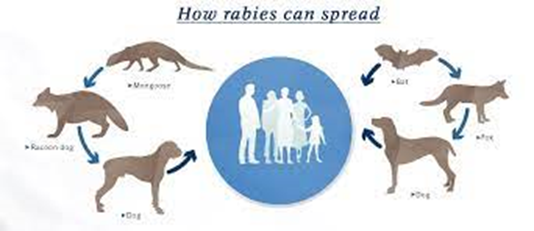Rabies
Overview
Rabies is a deadly virus
spread to people from the saliva of infected animals. The rabies virus is
usually transmitted through a bite.
Animals most likely to
transmit rabies in the United States include bats, coyotes, foxes, raccoons and
skunks. In developing countries, stray dogs are the most likely to spread
rabies to people.
Once a person begins showing
signs and symptoms of rabies, the disease nearly always causes death. For this
reason, anyone who may have a risk of contracting rabies should receive rabies
vaccinations for protection.
Symptoms
The first symptoms of rabies
may be very similar to those of the flu and may last for days.
Later, signs and symptoms
may include:
Fever
Headache
Nausea
Vomiting
Agitation
Anxiety
Confusion
Hyperactivity
Difficulty swallowing
Excessive salivation
Fear brought on by attempts
to drink fluids because of difficulty swallowing water
Fear brought on by air blown
on the face
Hallucinations
Insomnia
Partial paralysis
When to see a doctor
Seek immediate medical care
if you're bitten by any animal, or exposed to an animal suspected of having
rabies. Based on your injuries and the situation in which the exposure
happened, you and your doctor can decide whether you should receive treatment
to prevent rabies.
Even if you aren't sure
whether you've been bitten, seek medical attention. For instance, a bat that
flies into your room while you're sleeping may bite you without waking you. If
you awake to find a bat in your room, assume you've been bitten. Also, if you
find a bat near a person who can't report a bite, such as a small child or a
person with a disability, assume that person has been bitten.
Causes
The rabies virus causes a
rabies infection. The virus spreads through the saliva of infected animals.
Infected animals can spread the virus by biting another animal or a person.
In rare cases, rabies can be
spread when infected saliva gets into an open wound or the mucous membranes,
such as the mouth or eyes. This could happen if an infected animal licked an
open cut on your skin.
Animals that can transmit
the rabies virus
Any mammal (an animal that
suckles its young) can spread the rabies virus. The animals most likely to
spread the rabies virus to people include:
Pets and farm animals
Cats
Cows
Dogs
Ferrets
Goats
Horses
Wild animals
Bats
Beavers
Coyotes
Foxes
Monkeys
Raccoons
Skunks
Woodchucks
In very rare cases, the
virus has been spread to tissue and organ transplant recipients from an
infected organ.
Risk factors
Factors that can increase
your risk of rabies include:
Traveling or living in
developing countries where rabies is more common
Activities that are likely
to put you in contact with wild animals that may have rabies, such as exploring
caves where bats live or camping without taking precautions to keep wild
animals away from your campsite
Working as a veterinarian
Working in a laboratory with
the rabies virus
Wounds to the head or neck,
which may help the rabies virus travel to your brain more quickly
Prevention
To reduce your risk of
coming in contact with rabid animals:
Vaccinate your pets. Cats,
dogs and ferrets can be vaccinated against rabies. Ask your veterinarian how
often your pets should be vaccinated.
Keep your pets confined.
Keep your pets inside and supervise them when outside. This will help keep your
pets from coming in contact with wild animals.
Protect small pets from
predators. Keep rabbits and other small pets, such as guinea pigs, inside or in
protected cages so that they are safe from wild animals. These small pets can't
be vaccinated against rabies.
Report stray animals to
local authorities. Call your local animal control officials or other local law
enforcement to report stray dogs and cats.
Don't approach wild animals.
Wild animals with rabies may seem unafraid of people. It's not normal for a
wild animal to be friendly with people, so stay away from any animal that seems
unafraid.
Keep bats out of your home.
Seal any cracks and gaps where bats can enter your home. If you know you have
bats in your home, work with a local expert to find ways to keep bats out.
Consider the rabies vaccine
if you're traveling or often around animals that may have rabies. If you're
traveling to a country where rabies is common and you'll be there for an
extended period of time, ask your doctor whether you should receive the rabies
vaccine. This includes traveling to remote areas where medical care is difficult
to find.
If you work as a
veterinarian or work in a lab with the rabies virus, get the rabies vaccine.
Jan Ricks Jennings, MHA,
LFACHE
Senior Consultant
Senior Management
Resources, LLC
JanJenningsBlog.Bl;ogpost.com
412.913.0636 Cell
724.733.0509 Office
March 12, 2022




No comments:
Post a Comment